Divorce or separation from your spouse is an emotionally and mentally challenging time for you and the spouse. You also have to think about the children, legal aspects, and much more.
It is good to understand some best practices to make co-parenting after divorce work in Canada.
So, if you are looking for information to help you prepare for this journey, you have come to the right place. Our family lawyer has created a comprehensive guide for you to benefit from in Canada.
What is Co-Parenting after Divorce?
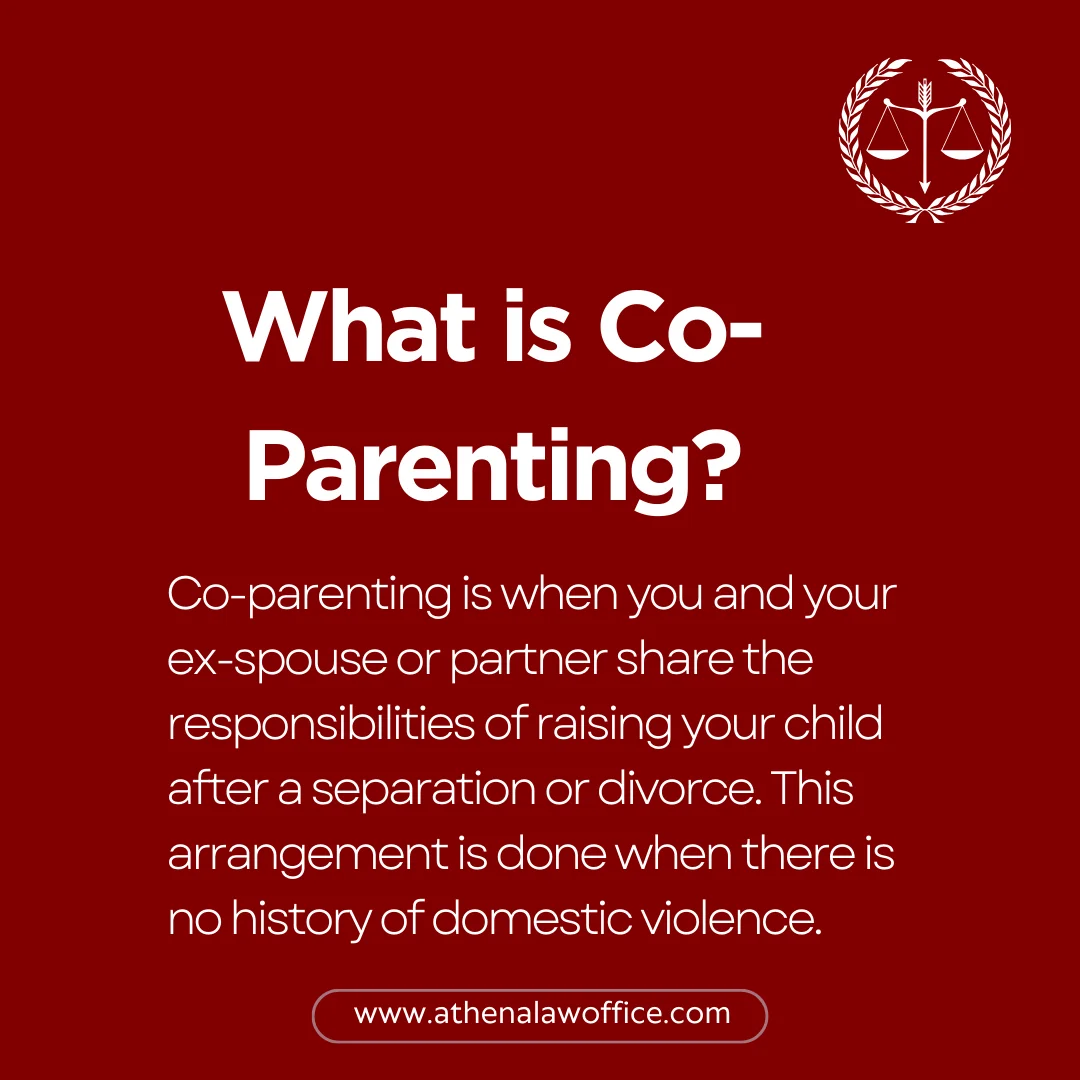
Co-parenting is when you and your ex-spouse or partner share the responsibilities of raising your child after a separation or divorce.
Yes, friction might exist between you and your partner, but you must ensure the best interests of your children. This parenting arrangement is done when there is no history of domestic violence or abuse involved within the relationship.
It offers the child some stability and guarantees that both parents can have a relationship with them.
Should Co-Parents Spend Time Together?
It is best for co-parents to spend time together if it is in the best interests of the children. For example, during birthday celebrations, holidays, and other such important events, the children would want both parents to be present.
In such an event, it is best to keep aside your differences for a few hours and make the day enjoyable for your children. You can establish boundaries with the co-parent and ensure that the time spent together with the child is amicable for smooth co-parenting after divorce.
Challenges with Co-Parenting after Divorce
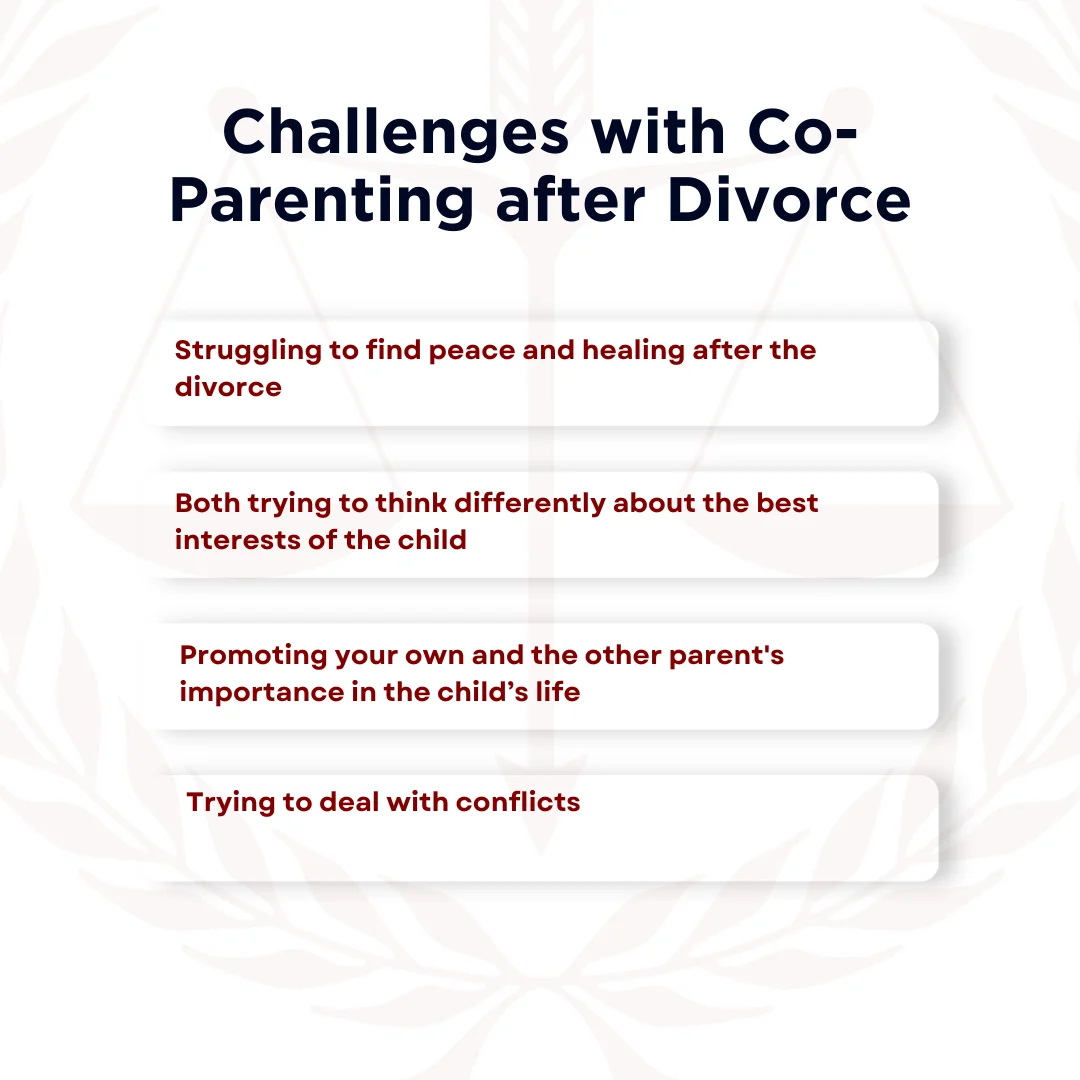
Co-parenting after divorce is not an easy task. You have to keep aside any differences between you and your ex-spouse and focus on the child.
According to a study done in 2022, there are a few recurring themes in co-parenting scenarios that lead to conflict, which include the following:
- Struggling to find peace and healing after the divorce
- Both trying to think differently about the best interests of the child
- Promoting your own and the other parent’s importance in the child’s life
- Trying to deal with conflicts
There are many other challenges that can come with co-parenting after divorce, but that depends on your unique scenario and case.
Consider all aspects of your and your child’s life to determine the best course of action for them. Communication is an important aspect that will lower the challenges you may face with co-parenting after divorce.
How Does Co-Parenting after Divorce Work in Canada: Co-Parenting Duties under the Divorce Act
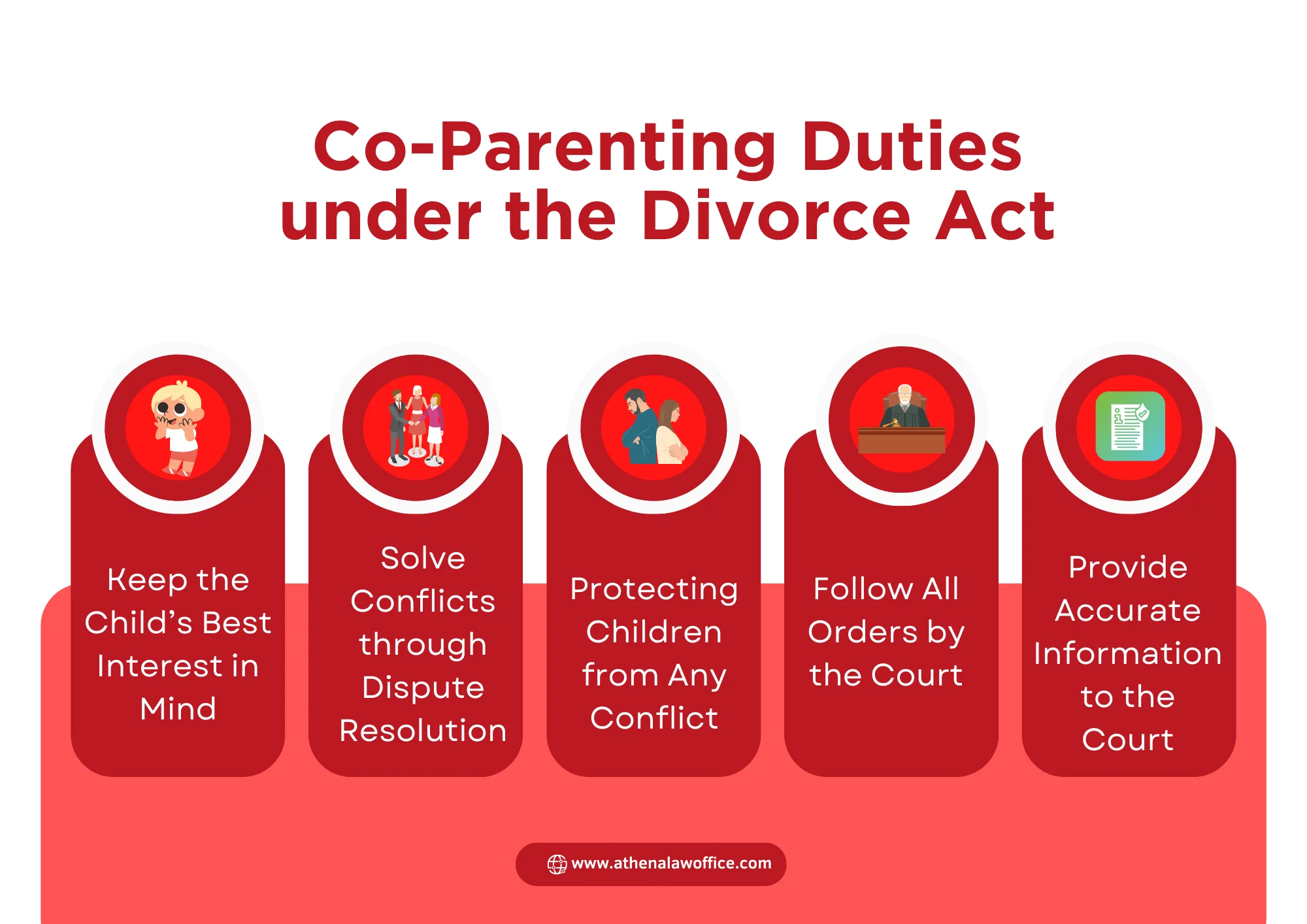
As a parent, you have certain duties you must uphold under the Divorce Act to make the life of your child as stable as possible.
According to the Divorce Act, here are some duties you must follow:
Keep the Child’s Best Interest in Mind
Anyone who has a custody order prior to March 2021 has a duty to act within the child’s best interests. The same is true if you have a parenting order from the court setting out your decision-making responsibilities and parenting time.
For example, if you are thinking about enrolling your child in extra-curricular activities or Sunday School, then you must consider whether this would be in the best interests of the child before making a final decision.
Solve Conflicts through a Family Dispute Resolution Process
Conflicts are inevitable in any type of relationship, which is why you must have a process to resolve such issues. For example, you can opt for mediation during or after divorce to resolve your conflicts.
However, if you want a faster and more affordable solution, then you can find someone to do family dispute resolution. Please note that this solution is not for everyone.
If you feel as if your safety is under threat or you have faced abuse or violence, then you will need to speak to your family lawyer in Ontario about the options you have available to resolve any disputes.
Protect Children from Any Conflict
If you have filed for divorce in Ontario under the Divorce Act, then you also have the duty to protect your children from any conflicts. What this means is that you should avoid providing details of your legal case with your children.
It protects the child and ensures that they don’t get in your mess. So, if your proceedings are still going on, we recommend you not discuss any details or involve your children in any way.
Follow All Orders by the Court
You have a duty under the Divorce Act to comply with any orders given by the court during your divorce and child custody proceedings. If you don’t follow these orders, you will face serious legal repercussions.
The reason for this is that the court will make decisions based on the best interests of your children. On the other hand, if your circumstances change, and you think that the court order is no longer applicable to your co-parenting situation, then you can apply for amendments.
Provide Accurate Information to the Court
Child support is an important aspect of making sure that children are protected after the divorce. This is why you must provide accurate information to the courts so that they can make an informed decision.
It is in your children’s best interest to provide accurate and up-to-date information to the courts. Your family lawyer in Ontario will guide you more regarding this matter.
How to Begin Co-Parenting After Divorce: A Complete Guide
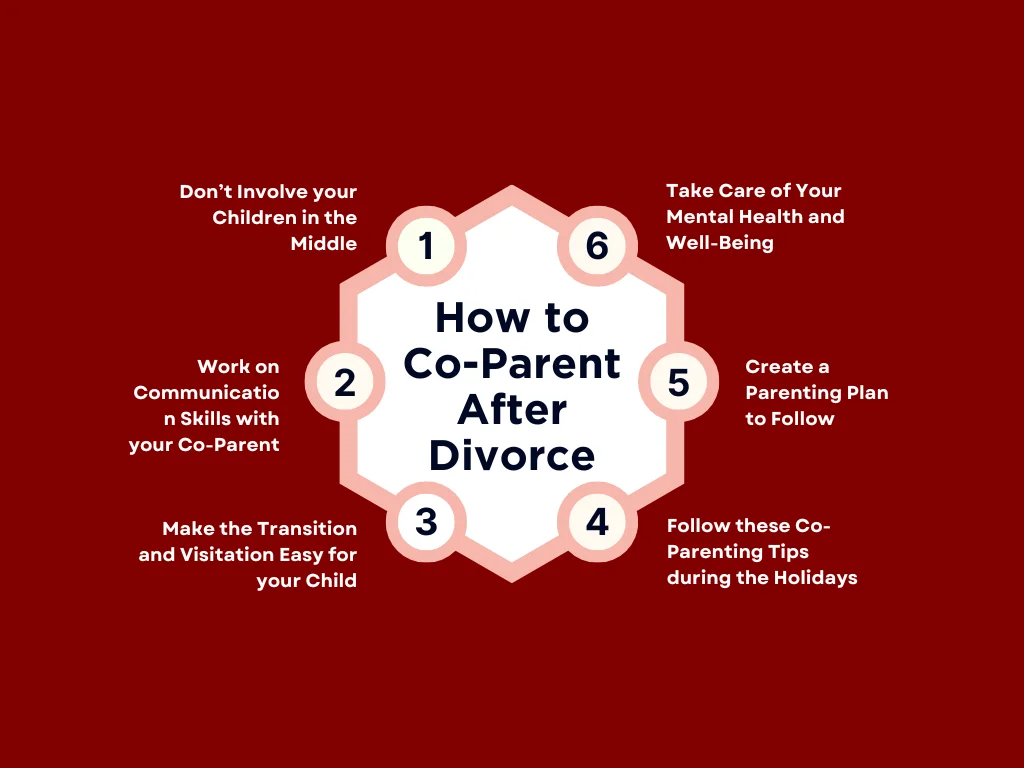
Now that you know the responsibilities under the Divorce Act, it is good to keep some best practices in mind that will help you with co-parenting after divorce.
Here is a guide on how to co-parent after divorce to ensure a smooth transition for yourself and your children:
1. Don’t Involve your Children in the Middle
After a divorce, you may have some bitterness or resentment towards your spouse or marriage. However, you should never subject your child to these issues.
It is important that you keep issues away from your children and resolve them separately.
Here are some general guidelines to follow to avoid involving your children in the middle as you begin co-parenting after divorce:
- Keep Issues to Yourself: Don’t bad mouth your ex in front of your children or make them feel like they have to choose. Your children have the right to a relationship with both parents.
- Don’t Use Your Children as Messengers: Using your children as messengers puts them in the middle of your issues. If you want to say something to your ex, you can email or call them directly.
2. Work on Communication Skills with your Co-Parent
Communication skills are the most important to learn when you begin co-parenting after divorce. It is a skill you can cultivate that will also help in other areas of your life.
Let’s review some best practices you can follow to ensure excellent communication with your co-parent after divorce:
Prepare What You Want to Talk About
If you want to talk about something important with your co-parent, then it is best to prepare what you want to talk about with them. Write everything down, and create pointers.
This will help you create a record of everything you want to talk about and also think through the issues. Then, you can calmly discuss what is on your mind with the co-parent.
Listen to the Co-Parent Carefully
Many people think listening is an easy skill, but that’s not true. Co-parenting after divorce means you have to take the time to listen to what the co-parent is saying.
Instead of jumping to conclusions or interjecting the co-parent when they are speaking, be sure to listen to them completely when they are speaking. Keep your assumptions aside, and listen carefully first.
A good practice is to listen objectively and take some time to think before you respond. This will help you keep your own interests aside and focus on what is best for your children.
Focus on Your Children while Co-Parenting after Divorce
It is crucial to keep the focus on your children rather than yourselves. Talk about what is best for them and how both of you can work together to meet your children’s needs.
Even if the arrangement is not too convenient for you, in the long run, your child will benefit from these arrangements. So, focus on what they want rather than what you want.
Hire a Professional When You Can’t Communicate
Finally, if you don’t want to communicate directly with your co-partner after divorce, then it is best to hire a mediator. They will focus on what is best for the child and help you communicate as you begin co-parenting after divorce.
If you are looking for a mediator, then you can opt for our family law services in Ontario to ensure your post-divorce parenting process is as smooth as possible.
3. Make the Transition and Visitation Easy for your Child
It is often emotionally and mentally difficult for children to move between mom and dad’s house as they begin co-parenting after divorce. As they leave one parent’s house, they reunite with the other.
While this is inevitable, we recommend you make the process as easy for your child as possible. According to our family lawyer, here are some things you can incorporate to make this process easy:
Make Sure Leaving the Home is Easy
As it is time for your child to leave your home and go to the co-parent’s home, it is up to you to ensure they have a positive experience. You can do this by:
- Staying positive when the time for the drop-off is near
- Help them pack in advance, so they have everything they need
- Wait for the child to be dropped off later instead of asking to pick them up
- Remind the children that they will leave in a day or two to the other parent’s house
Doing this will help your child to remain positive and prepare for leaving the home.
Making the Return Positive
Once it is time for the child to return to your home, you can help them adjust once more. Here is what you can do:
- Have some downtime when they return so they have the time and space to settle in again
- If they need space, let them have it
- Create a special routine when they return each time, such as making their favourite good or playing a board game
Kids love some stability and routine, which is why it is important to keep some things the same and have little routines and rituals.
Have a Plan to Deal with Refusal
If you have joint custody with your co-parent after divorce, then there might be times when your child will refuse to leave and stay with the other.
As you are co-parenting after divorce, you must take these things into account and deal with visitation properly.
Here are some things you can do to ensure the best interests of your child:
- Find out why the child doesn’t want to meet the other parent
- Give your child the space and time they need during such refusals
- Talk to your co-partner and figure out what you can do to deal with this situation
Most cases of visitation refusal are temporary, and it is up to you to deal with them properly. It can be an emotional and challenging time, but it is important not to take this personally and remain understanding and sensitive to your child’s needs.
4. Follow these Co-Parenting Tips during the Holidays
View this post on Instagram
Co-parenting after divorce is challenging all year, but it can be even more difficult during the holidays. The child will want to spend time with both parents as it is a special time, which is why it is important to keep these things in mind.
You can create a co-parenting schedule for the holidays in your separation agreement in Ontario or work it out later, depending on your circumstances.
However, here are some co-parenting tips during the holidays that will make it easy for you and your co-parent:
- Respect Agreements: It is important to respect the agreements you have set with your co-parent and adjust to one another’s schedules during the holidays
- Prepare the Children: Holidays mean that the routine of children will change, and so will their plans. Make sure you prepare your children for this change during the holidays
- Create a guide: Sit down with your co-parent or opt for a lawyer to help you create a guide you can follow for all holidays
These tips will help you with co-parenting after divorce as you navigate holidays.
5. Create a Parenting Plan to Follow
It is always good to have a plan that you and your partner can agree on. This will help you establish important boundaries, and everyone will know their expectations.
If you are unsure of how to create such a plan, you can get in touch with a mediator or lawyer to help you and your co-parent create a plan that suits everyone.
On the other hand, you can also communicate clearly with your spouse and figure out how you will navigate co-parenting responsibilities or use this parenting plan tool by the Government of Canada.
6. Take Care of Your Mental Health and Well-Being
During these tough times, it becomes more important than ever to care for your mental health and well-being. If you think co-parenting after divorce is difficult, you can get in touch with a professional to care for your mental health.
There are also various support groups and resources in Ontario that can help ease such times for you. So, keep your mental health and well-being your top priority, and everything else will eventually fall into place as you get used to co-parenting after divorce.
List of Co-Parenting Boundaries
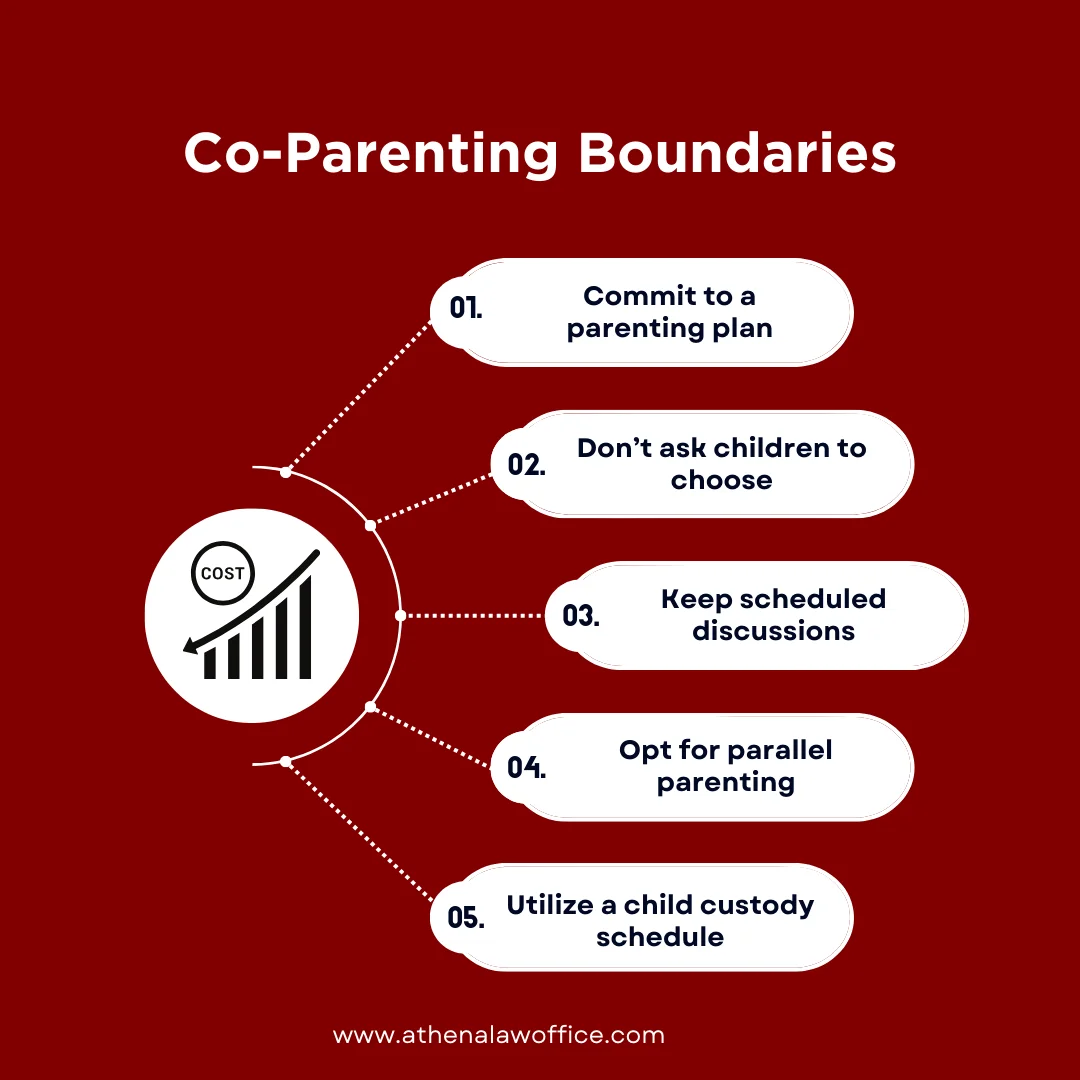
Setting healthy boundaries is one of the key elements of successful co-parenting after divorce.
These will help you navigate the challenges that come with co-parenting and ensure effective communication between you and your co-parent.
Our family lawyer has created a list of co-parenting boundaries to ensure the best interests of your children:
- Commit to a parenting plan you and your co-partner can follow
- Determine a parenting style both of you can manage to follow
- Make a pact not to speak badly about the other in front of your child
- Don’t ask children to choose between you and the other parent
- Create boundaries around not discussing your new relationships with your children and one another
- Keep scheduled discussions about your child’s life
- Only communicate about your child with one another
- Opt for parallel parenting
- Utilize a child custody schedule
- Follow the parenting plan both of you have set
These co-parenting boundaries will help you and the co-parent establish a healthy relationship with your child as you begin co-parenting after divorce.
Co-Parenting Apps in Canada You Can Download
If organization isn’t your strong suit, and you need a tool to facilitate co-parenting after divorce, then we recommend you download an app. There are various co-parenting apps in Canada that will help you collaborate with your ex-spouse.
Here are some of the top apps we recommend to our clients to help them in their co-parenting journey:
1. Our Family Wizard – Best for Collaboration & Communication
If you are looking for one of the most popular co-parenting apps in Canada approved by the courts, then look no further than Our Family Wizard.
It promotes collaborative communication when co-parenting after divorce. There are many unique features of this app, which include sharing:
- Messages
- Events
- Expenses
- Professional accounts such as therapist
- Positive communication
There is a ToneMeter that works as an add-on where it spell checks your tone. It picks up on any negative tones in your communication and provides you with more positive alternatives.
So, if you are looking for some help during your co-parenting after divorce journey, you can download this today.
2. Cozi Family Organizer – Best for Organization
Cozi Family Organizer has won the Mom’s Choice Award three times till now. It is one of the top apps that will help you organize as you begin co-parenting after divorce.
It is a simple way to manage your daily life, as its features include sharing:
- A calendar
- Grocery lists
- Reminders
- Meal plans
- To-do lists
- And much more
The basic program of this app is free, making it incredibly user-friendly and affordable for everyone. So, if you want to begin organizing your family life, start using this app for free for seamless co-parenting after divorce.
3. CoParenter – Best for an All-in-One Solution to Co-Parenting after Divorce
The CoParenter app is a one-stop solution for everyone looking for help with co-parenting after divorce. Here are some of the top features of this app:
- CoParenter Calendar: You can swap days or special events or use it to stick to the same schedule for your children
- Coaching & Mediation: You can have supervised conversations with your co-parent through the help of mediators. They can also help you document any resolutions
- Check-Ins: You can use this to timely exchange drop-offs and pickups for your kids
- Transcripts: You can turn the conversations into transcripts to admit into court as records
All of these features will help you co-parent with ease so that you can have the ease and convenience you require as you begin co-parenting.
FAQs
Who gets child custody after divorce in Canada?
Both parents have equal custody and care of the child. However, in the case where there is no court order, then the parent with whom the child lives gets automatic custody, and they have the right to make daily decisions for the child.
Can a father give up parental rights in Canada?
A court has the discretion to terminate the parental rights of the father if it is in the best interest of the child. On the other hand, fathers can also voluntarily give up their rights in Canada.
Can a mother move a child away from the father in Canada?
According to the Supreme Court of Canada, a custodial parent can’t move the child away without the consent of the other parent. So, as a mother, you will need the consent of the father before you move the child away.
Who has legal custody of a child when the parents are not married in Canada?
In a domestic partnership or any relationship where the parents are not married, both parents will have equal rights to the child.
Final Thoughts
Co-parenting after divorce is not easy because you have to keep all your emotions aside and think for your children and their best interests. However, it is good to know some best practices and co-parenting apps to begin your journey.
If you require more help with co-parenting, you can get in touch with our family lawyer in Scarborough and surrounding areas. We will be more than happy to help you with your journey of co-parenting after divorce.
Author Profile

- Barnett Law is a trusted and knowledgeable lawyer in Scarborough. Her expertise spans real estate law, family law, adoptions and fertility law. A lawyer by profession and a humanitarian by heart, Athena Narsingh Barnett wants to help people become more familiar with the legal system and be well-informed to make important legal decisions.
Latest entries
 legal guidanceNovember 12, 2025How To Avoid Land Transfer Tax Ontario?
legal guidanceNovember 12, 2025How To Avoid Land Transfer Tax Ontario? legal guidanceOctober 31, 2025How Much Is Land Transfer Tax In Ontario?
legal guidanceOctober 31, 2025How Much Is Land Transfer Tax In Ontario? Family LawOctober 27, 2025How Much Does A Divorce Cost In Ontario In 2025?
Family LawOctober 27, 2025How Much Does A Divorce Cost In Ontario In 2025? Family LawOctober 22, 2025Divorce Rate In Canada 2025: Top Divorce Statistics To Know
Family LawOctober 22, 2025Divorce Rate In Canada 2025: Top Divorce Statistics To Know

